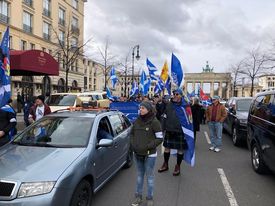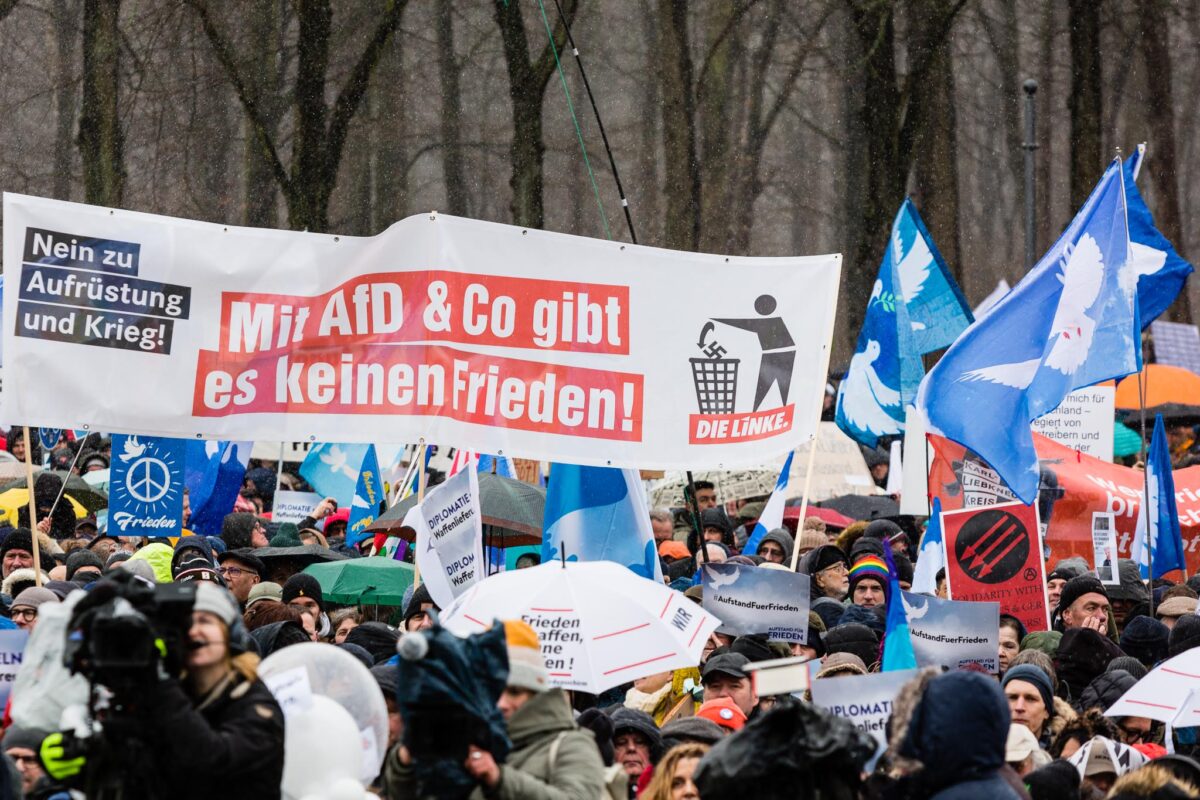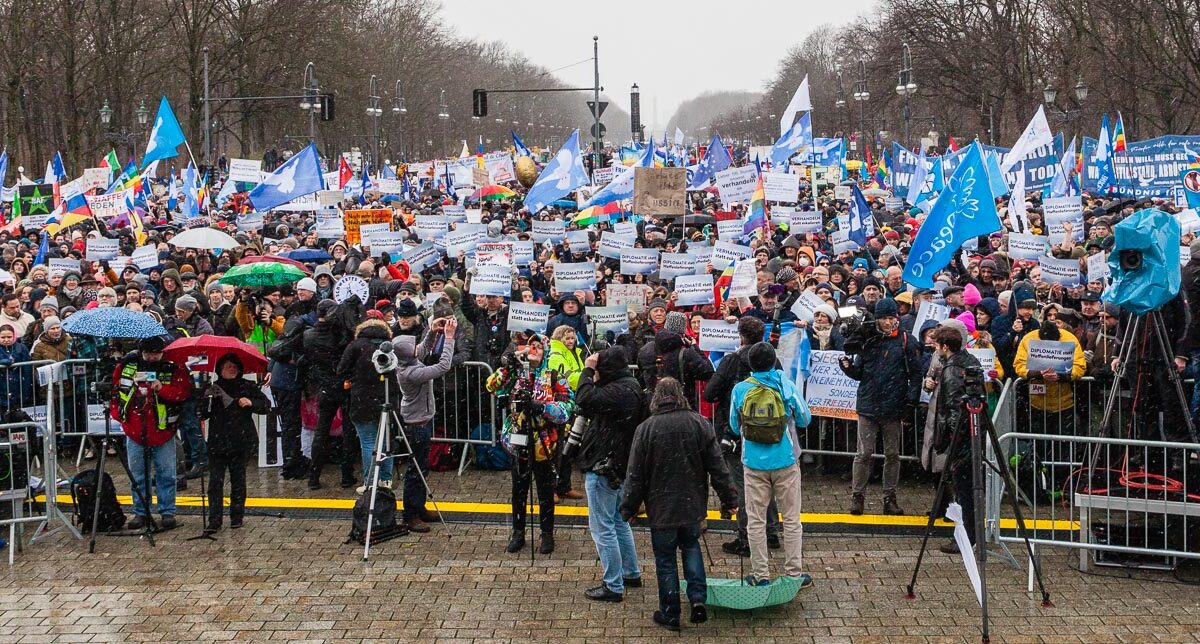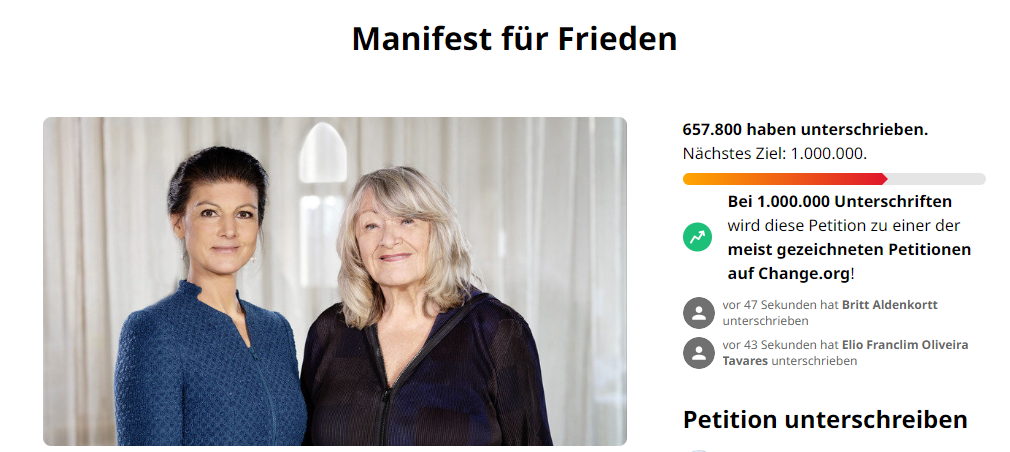The following interview with Christine Buchholz was conducted by Yaak Pabst, and originally appeared in German on the marx21 website.
Hundreds of thousands of people have signed Sahra Wagenknecht’s and Alice Schwarzer’s “Manifesto for Peace”. The initiators are calling for protest on the streets. How should the Left treat the call for action?
The Manifesto for Peace has received half a million signatures inside just a few days. How do you assess this?
It is absolutely positive that voices in society which oppose the delivery of weapons are getting louder. One year after the Russian invasion, a war is raging in Ukraine which has brought immeasurable misery and death. We need a strong anti-war movement which expresses what many people are thinking; “Stop the war! Stop the escalation! No to the delivery of weapons!”, and thus puts pressure on the German government.
Why now?
The Munich Security Conference begins on Friday [translator’s note: this interview took place before last week’s annual NATO conference in Southern Germany]. As at the meeting of the Ukraine contact group, where the Ukrainian government talks to the defence ministers of the NATO countries and other allied states, at the Security Conference, there will be a call for more heavy weapons, more ammunition, fighter jets and long-range missiles.
The head of the Security Conference Christoph Heusgen has already demanded fighter jets for Ukraine and wants more German “leadership”. We can expect that one year after the start of the war, war propaganda will be ramped up. With this background, it is important that there is a series of calls for local actions on 24th and 25th February. For this reason, I also welcome the “Manifesto for Peace” and the call from Sahra Wagenknecht and Alice Schwarzer to mobilise for a rally on 25th February in Berlin.
But Russia invaded Ukraine? Is it right to speak of an escalation from the West?
Putin is fully responsible for the attack on Ukraine. But the war has a double character. It is a legitimate fight for the right to self-determination for Ukrainians against an imperial occupying force. But it is also a proxy war by NATO, the USA and the EU against their imperial competition Russia. Finally, it has led to a dangerous escalation.
In what way?
The reaction of the Western bloc just throws oil into the fire. That goes from the delivery of weapons and the extensive sanctions régime to that movement of NATO troops to the Eastern border with Russia, up to the massive armament plans of individual countries. These politics are a cul-de-sac, as they further fuel the spiral of escalation and bring no peace and justice to people – neither in Ukraine nor world-wide.
It is fatal to send even more weapons into this war. This is the point where I agree with the call from Wagenknecht and others.
Where do you disagree?
The call has weaknesses, specifically the phrase “damage to the German people”. The German people as such are not suffering. The German armaments industry and other factions of Capital are making tidy profits from this war. We should point out that it is above all workers and poor people in Ukraine, Russia and in other countries who are dying and suffering in this war.
What else bothers you about this call to action?
There is not a single word about the militarisation and massive rearmament of the German army. Given the lack of money for schools, hospitals and the public sector, this is an important concern for the Left.
Why?
Defence minister Boris Pistorius wants to further increase the military budget and is demanding €10 billion more per year for the army. Der Spiegel is using Pistorius’s plans to raise fear that public sector wage increases could reduce the operational readiness of the army.
Some Leftists do not want to go to the rally for these reasons. Is this the right reaction?
Although the call does not refer to the question of militarisation, we must clearly make this point. On the mobilisation for 25th February, the Left has the chance to make public our own position against the war, the delivery of weapons and against the massive militarisation. I find that not going is not an option.
It is really important not to hand over the protest against war and the delivery of weapons over to the AfD. At the moment, the right wing is using this subject to build. Of course they are fully untrustworthy, but unfortunately, they are also enjoying some success.
Chrupalla, the leader of the AfD has signed the call…
It was a problem that Tino Chrupalla signed the call, as you can’t make peace with fascists.
But that is why it is important that Sahra Wagenknecht has clearly said that she does not want any support from the AfD. National flags, AfD flags and right wing symbols have been banned from the demonstrations, and there are stewards to carry this out.
Chrupalla has since tweeted that he has no desire to take part in a left-wing demo, and that the AfD will organise their own peace rallies. Is everything ok now?
Of course part of the right wing scene will try to instrumentalise the demo. But it is decisive that many Leftists mobilise with banners and flags which marginalise the right wing.
At the beginning of the Hartz IV protests, Nazis tried to hijack the demos. It was important that the Left did not stay away, but fought for hegemony of the protests.
Oskar Lafontaine [translator’s note: former leader of die LINKE] has been accused that he softened the distancing from the right wing in a video interview where he said “everyone who has a heart for peace is elected”. Here he is appealing directly to AfD voters. What do you think?
Oskar Lafontaine wants to win back former LINKE or SPD voters who voted AfD as a protest. And sure: Die LINKE has never made a “test of beliefs” to determine who is allowed to attend a demonstration, How would that work? Nonetheless Lafontaine is wrong here.
Why?
He should have clearly said that Nazis who pretend that they are for peace are not welcome. He did say in his interview that Reichsbürger flags are not welcome, and that the protest should not be instrumentalised. But that is too little. AfD politicians and flags will also not be tolerated. His whole approach shows that he underestimates the danger which comes from the Fascist troops organising in the core of the AfD. And he concentrates too much on AfD protest voters.
It would be better to look at the many who do not vote, or who vote LINKE, SPD or Green. Very many of them are against the delivery of weapons. I take Sahra Wagenknecht at her word. The AfD and fascists are not wanted, and a stewards’ committee will make sure that national flags, AfD flags and right wing symbols will not be allowed.
One argument against the call says that the feminist Alice Schwarzer and [co-initiator] Brigadier General Erich Vad are right wingers with whom you should not demonstrate.
There are other people with whom I’d prefer to demonstrate. But we must also see that because of the militaristic role of the SPD and Greens that there are many people in their circle who are not against the delivery of weapons.
People reject the delivery of weapons and the escalation process for many different reasons. I think we must take the divisions in society forward productively, even if we have little in common with some of our partners.
I’m one of the hardest critics of Alice Schwarzer’s position on Islam and the head scarf. She fuels prejudice against Muslims, for example when she demands that only women and children should be allowed as refugees from Afghanistan, but no men.
But just because I demonstrate with her against the delivery of weapons and the danger of escalation, that does not mean that I agree with any of her other positions.
What about Erich Vad?
Erich Vad is not an anti-militarist. Quite the opposite. He stands for a European imperialism under German leadership which is independent from the USA. This brings him partly into conflict with the politics of the German government, which tries to implement the interests of German and European Capital in a different way,
Erich Vad bemoans the insufficient operational readiness of the German army. This leads him to fight “structural pacifism” of Germans since the experiences of the Second World War and the deployment of the German army in Afghanistan.
I reject all this. But it hurts German imperialism when one of their own criticizes the current politics. We can use this if we don’t sweep his position under the carpet. His assessment of the war, which is informed by his militaristic view, is interesting and helps us understand the conflict situation.
By the way, the peace movement always had soldiers in their ranks who were not anti-militarists, but who expressed the contradictions of ruling politics.
In 2003, Vad had an article published in the neo-Right publication “Sezession”
That is right, even if he declared in 2010 that he wouldn’t do it again. But it is clear that Vad belongs to the right wing conservative wing of the German military. Like many in the CDU, he has held culturally racist and anti-migration positions.
But one thing is important: unlike other right-wing soldiers, he has not gone over to the AfD in recent years. This is why I find it defensible to take part in a rally at which Erich Vad is speaking.
If we make the rally large, will Sahra Wagenknecht just use this?
The success of the call is partly because die LINKE and the different parts of the peace movement responded inadequately to the demands brought by war. A vacuum emerged, which Wagenknecht and Schwarzer have filled.
I see it differently to your question. If the Left – inside and outside the party – is not present, and not intervening with our own materials, we don’t just take ourselves out of the debate, we also fail to build an alternative to the established.
Sahra Wagenknecht expresses justified criticisms of the escalation spiral from the delivery of weapons and sanctions. We are in agreement on this point. At the same time, I do not want to adopt her parochial nationalistic positions on the German economy or her concessions to the right wing, for example on the question of migration.
Is it possible, that a new Querfront [translator: German term meaning an alliance of the left and far right] will emerge?
There are right wing forces, like Compact magazine from [Jürgen] Elsässer and others, who want to build the extreme right through such Querfronten. We have the experience of the large demonstration in Prague, at which both Leftists and the extreme right wing took part. And also part of die LINKE is open for alliances with the right.
This excludes other forces from alliances, and leads away from the class politics that we as die LINKE want to develop. Our slogan must be: “Neither Putin nor NATO. Solidarity with the international resistance against the war”.
Left wingers should prevent such alliances because they do not lead to success. But because the militarism of the ruling class is so rampant, and concern in the population is growing, I find it imperative that under the current conditions we do not stand aside but strongly mobilise around the demands against the export of weapons and militarisation. It is enormously important that we combine the fight against war with that against high prices.
In the LINKE party executive, you proposed that the party mobilises for the rally and intervenes with its own profile. Won’t that split Die LINKE?
It is clear that we have very different points of view within the party. But it is no alternative to do nothing in the face of the development of war. I am trying to speak both with comrades who are explicitly for taking part on 25th February, and those who are strongly against.
It is important to make clear that we all want to marginalise the AfD and the right, and to position Die LINKE as an anti-war party. We clearly see different paths to this goal. But we combat divisions through debate.
The biggest current danger is that the AfD emerges as the only partner for peace. Die LINKE must take to the streets with its own placards and banners with our ‘No to war’ and ‘No to the delivery of weapons’ slogans.
Christine Buchholz is a former MP and a member of the LINKE National Executive.
Questions: Yaak Pabst. Translation: Phil Butland. Reproduced with permission.



